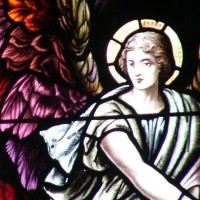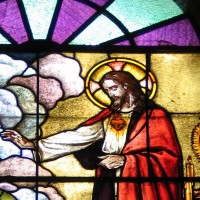There is no pregnant pause after the angel finishes his five point message on the Messiah. Mary just blurts out the question that has been forming all the while.
How will this be,” Mary asked the angel, “since I am a virgin?” (Luke 1:34)
The echo of this question has resounded throughout history.
Logic or Mystery? This question has been the crux of faith since Mary first asked it. The virgin conception of Christ is so important that without it, Christianity ceases to be. If Jesus was just another run of the mill human, then He isn’t God.
The idea of the virgin conception is foundational to Christianity. In fact, it’s fundamental.
In 1909, Lyman Stewart financed the publishing of a set of essays that would change the American religious landscape. The Fundamentals: A Testimony To The Truth was a set of 90 essays in 12 volumes published from 1910 to 1915. Initially, they were merely designed to affirm orthodox Protestant beliefs and these essays were to be sent free of charge to vocational and lay Christians. The Fundamentals rapidly became a lightning rod for criticism by the journalistic world resulting in giving us one of the great pejorative terms of the 20th century and beyond: Fundamentalist.
In 1920 Curtis Lee Laws, editor of the Northern Baptist paper The Watchman-Examiner, coined the word Fundamentalists to describe those “who still cling to the great fundamentals and who mean to do battle royal” in order to protect what they saw as central tenets of the Christian faith.
Within 60 years, the term fundamentalist had become a synonym for blind ignorance, opposition to the spread of modern scientific knowledge and intellectual advancement, and is now applied to many different religions but always with the same unfair flavor of ignorant zealot.
Ninety essays (in 12 volumes) were probably a bit excessive which may have contributed to their ridicule. However, among those 90 essays, we can discern five foundational doctrinal beliefs shared by Christians of diverse backgrounds. One of these is the virgin conception, sometimes referred to as the virgin birth.
In the horizontal flow of scientific evidence of how conception occurs, there was a singular break.
The virgin conception: science cannot test or prove it.
History cannot empirically verify it through the convergent observations of the past.
Reality–as observed by billions of people since the beginning of time–cannot explain it.
This is why it is a crux of faith.
 It’s not that Christians are fools who deny both science and history. We are not stupid, anti-intellectuals who stare at information with a blank vacuity incapable of understanding a vast pile of evidence. Rather, we look at the history of the world and scientific understanding as a horizontal line of human existence and yet, we see more fully. We see with spiritual sight and therefore, we see God’s underscoring it all.
It’s not that Christians are fools who deny both science and history. We are not stupid, anti-intellectuals who stare at information with a blank vacuity incapable of understanding a vast pile of evidence. Rather, we look at the history of the world and scientific understanding as a horizontal line of human existence and yet, we see more fully. We see with spiritual sight and therefore, we see God’s underscoring it all.
This line of human existence doesn’t go back infinitely, both science and history agree with Christianity on this one. If God could give us the first Adam, God could give us the last Adam, the Messiah, Jesus Christ. It’s beyond scientific. Its roots are firmly established in historical antiquity before time began. It’s the crux of faith.
1 Corinthians 15: 45 So it is written: “The first man Adam became a living being”; the last Adam, a life-giving spirit. 46 The spiritual did not come first, but the natural, and after that the spiritual. 47 The first man was of the dust of the earth, the second man from heaven. 48 As was the earthly man, so are those who are of the earth; and as is the man from heaven, so also are those who are of heaven. 49 And just as we have borne the likeness of the earthly man, so shall we bear the likeness of the man from heaven. 50 I declare to you, brothers, that flesh and blood cannot inherit the kingdom of God, nor does the perishable inherit the imperishable.
 Angels are created beings. Their role was to mediate heavenly revelation from God to man (prior to the coming of the Christ and nowadays the indwelling of His Holy Spirit), to help the pious, and in the future to do God’s will with respect to judgment. Basically, they are servant messengers of God. So when the angel answered, it was because God gave Gabriel an answer to give.
Angels are created beings. Their role was to mediate heavenly revelation from God to man (prior to the coming of the Christ and nowadays the indwelling of His Holy Spirit), to help the pious, and in the future to do God’s will with respect to judgment. Basically, they are servant messengers of God. So when the angel answered, it was because God gave Gabriel an answer to give.







